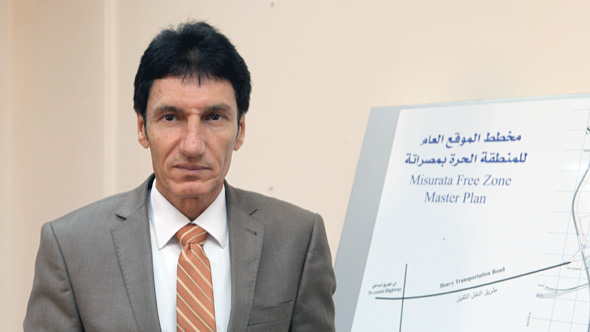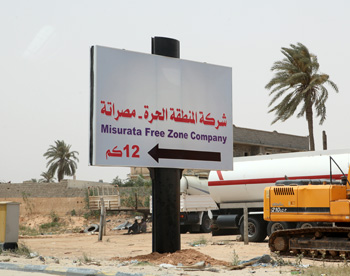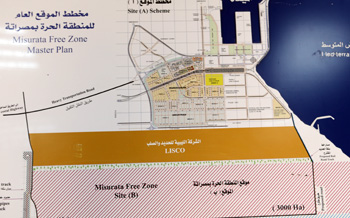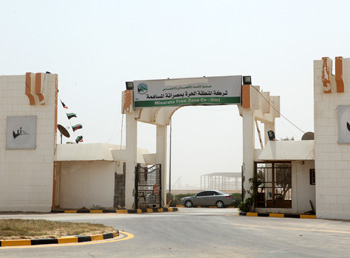Misurata Free Zone: One of the Top Locations for Foreign Investors in Libya
Jamal A El-Ghirani, Investment General Manager of Misurata Free Zone
Misurata seems to be the most stable place and the most secure city at the moment. Misurata Free Zone as a company employs approximately 1,223 people. There are many investors on the ground in the free zone. The bottom line is that the free zone is trying to and has created a lot of job opportunities for Libyan youth; within 20 years there should be up to 80,000 job opportunities. The Misurata Free Zone receives business delegations all the time; ambassadors from foreign governments visit the zone on a frequent basis.
Interview with Jamal A El-Ghirani, Investment General Manager of Misurata Free Zone

Based on you very unique perspective that you have thanks to your different background from the United States, what is your take on the feasibility of business here in Libya?
I think Libya has changed since the revolution. I truly think things here will be much better and much easier. It will be extremely easy for foreigners and foreign companies to come and do business in Libya.
The previous regime did allow corruption and other bad things to happen for whatever reason. We are trying to change that image of Libya now. There was a lot of corruption during the previous regime and we hope, and in fact we are almost certain, that all of these obstacles will be taken away and we will have a lot of transparency and promotion of new business opportunities for foreign investors.
As you know, Libya is hungry for just about everything. The country lacks a lot of infrastructure and facilities that foreign investors need to do business. The bottom line is that in the previous regime, Libya was a terrible state and that is the image that most people have of us but we are trying to change that and  I truly believe that we can overcome all of these obstacles once the country stabilises and that Libya will be a good place for foreign investments, offering all the guarantees that foreign investors require to protect their investments.
I truly believe that we can overcome all of these obstacles once the country stabilises and that Libya will be a good place for foreign investments, offering all the guarantees that foreign investors require to protect their investments.
Now that we are in a free post-Gaddafi Libya, what are the developments that make you believe that there is a bright future for Libya? Lately Libya has been negatively portrayed in the media; we were recently talking with a gentleman from an investment fund who said that Libya ranked worst against its neighbouring countries in terms of doing business. What sort of positive developments make you feel optimistic about the future of Libya?
The developments and the positive things that I want to speak about may not be present now but we know that in the new Libya there will be democracy, freedom of expression, etc.. We need stability, in the past Libya did not have the stability that gives foreign investors the assurance they need to come and invest here. Libya is not there yet but with the new constitution that is being drawn up now, we are sure that we are not going to stop short of that; i.e. stability. The Libyan people are going to ask for this, they are eager to have this country developed. There are some new institutions that are being formed and some new laws that are being drafted which will guarantee success for foreign investors in the country. Things are happening but slowly.
From your talks with different foreign investors, can you tell us why they are interested in doing business in Libya?
We get business delegations coming to Misurata Free Zone all the time; ambassadors from foreign governments come here on a frequent basis. We have had the Italian ambassador and the Danish ambassador amongst many others visit the free zone and none of them seem to be afraid to visit or to invest.
We at Misurata Free Zone speak to local and foreign investors almost on a daily basis. There is a lot of demand for investment within the free zone and that is partly because of the benefits, privileges and exemptions that we give to investors. Some of the main benefits are exemption from corporate income tax for the life of the project, unlike in other free zones in the region where there is usually a time limit on this exemption. There is also exemption from all custom duties, they can bring in all of their project materials, whatever is required and they won’t have to pay any customs tax. The other thing that Libya has that really gives it the edge over other free zones in the area is the cost of energy sources. Energy, as you know, in Libya is very cheap, whether it be electricity or fuels etc. I think the energy sources are cheaper than anywhere else around us.
I would also like to address the fact that we are governed by Law no.9, of the year 2000. This gives certain guarantees and privileges to the investors within the free zone. Therefore their investments and facilities within the free zone are protected by law and benefit from, as I mentioned, tax exemptions and also the strategic location here in Misurata. We are right on the other side of Europe and we are the gateway into Africa.
Libya needs just about everything at the moment; it is importing everything, even refined oil products. We are a country that produces crude oil but we only refine a limited quantity of the requirements here in Libya. We export crude oil and it comes back to us in its refined forms.

The bottom line is that Libya as a country and a market that is in need of everything. Therefore investors can have the assurance and guarantee that whatever they manufacture in the free zone will have a market here. There is a guaranteed local market and also if they have excess produce they can export it out of Libya totally free of any export duties or fees. The other thing is that the cost of labour is still not very high in Libya compared to Europe or the United States. We have skilled manpower available here in Misurata and in Libya in general.
How would you differentiate Misurata from Tripoli or Benghazi? Why should foreign investors come to this city in particular? Is there more stability and safety here?
Misurata seems to be the most stable place and the most secure city at the moment. We have not had any major incidents, violations, bombings or things of that nature. So the security in Misurata seems to be very good. This is accomplished on a local level, the people of Misurata, the local government or military council are working really hard to make sure that Misurata is safe and secure for everybody. We want to portray this especially to foreign investors, as they will not come to the free zone or anywhere else unless you can really show stability.
Another advantage that Misurata has, in my opinion, is its seaport, which happens to be the biggest or at least the busiest in the country. It is the only port in the country that is not run by the government. All of the other ports in Libya are operated by the Ministry of Transportation, whilst the commercial port in Misurata is operated by the free zone. Therefore one of the advantages that we have here is that the decision making process is done much faster here because we don’t have to go outside the Board of Directors of the free zone. So decisions are made quickly and the application process for investors within the free zone normally takes between 30 to 45 days. We offer advantages that I don’t think are available elsewhere in Libya. 
If you compare the seaport of Misurata to the seaport in Tripoli, you will find that the port in Misurata has easier access as it is outside of the city limits, whereas the port in Tripoli is in the city centre. As a matter of fact there has been a lot of talk about the difficulties in accessing the port in Tripoli and the problems of congestion that its location causes.
Do you know how much direct and indirect economic effect Misurata Free Zone was able to generate over the past 2 years?
Misurata Free Zone basically gets its revenues from two main segments, the first is the seaport. The revenues from the seaport come to Misurata Free Zone. Misurata Free Zone as a company employs approximately 1,223 people. We have many investors on the ground in the free zone. The bottom line is that the free zone is trying to and has created a lot of job opportunities for Libyan youth. This is one of our main objectives at Misurata Free Zone, to create job opportunities for the Libyans to help stimulate the Libyan economy. When investors come to the free zone they bring a lot of operational capital and this brings money into the city. The companies that operate within the free zone purchase a lot of whatever they need from the local market, whether from Misurata or outside of Misurata but still within Libya. Therefore I think we have contributed significantly to the growth of the Libyan economy.
Of course we are not fully occupied yet at the free zone. We still have a lot of space for investors and we are trying to promote the free zone within Libya and outside of Libya. We want to attract local and foreign investors. I think we will create a lot more job opportunities. The numbers that we have based on feasibility studies carried out for us by some international expert firms indicate that within the first 5 years we should employ around 31,000 people. Within 20 years that number should increase to around 80,000 job opportunities within the free zone.
Misurata seems to be the most stable place and the most secure city at the moment. We have not had any major incidents, violations, bombings or things of that nature. So the security in Misurata seems to be very good.
Once we are fully established and operational I think we will have a huge impact on the Libyan economy. We want to help the Libyan economy and to help Libya diversify its revenues. As everybody knows the main source of revenues for Libya is oil and gas. We are trying to change that. I think free zones, whether in the city of Misurata or elsewhere in Libya will contribute significantly to the Libyan economy.
What is the volume of foreign direct investment that you have been able to generate in 2012 and what is the outlook for 2013?
The amount of foreign direct investment that has been invested in Misrata Free Zone in the last 5 years is in the hundreds of millions of dollars. I can’t give you the exact figure right now; I would have to look it up. It is a good number.
The outlook is bright. We do have some difficulties, one of which is the completion of the infrastructure project for the investors within the free zone. The project was awarded to a Turkish company before the revolution but they stopped their activities during the revolution. However just recently we signed a resumption agreement with the contractor and now they are in the process of re-mobilisation. They should be fully operational in 30 to 45 days. We believe the outlook will be good.
We are also trying to expand the capacity of the seaport in Misurata. We are executing a contract with a Turkish company, who will complete a project that entails the addition of another 800m of quay space within the free zone port at a depth of -13m. We believe that will attract a lot of ship owners and shipping companies to come to Misurata rather than other neighbouring countries. Our goal is to have direct call on the port of Misurata from the Far East and the United States, where bigger ships will come to the port of Misurata, i.e. for transhipment where the goods, whatever they may be, to be placed on smaller ships to be distributed to the rest of the Libyan ports and the neighbouring countries.
The numbers that we have based on feasibility studies carried out for us by some international expert firms indicate that within the first 5 years we should employ around 31,000 people. Within 20 years that number should increase to around 80,000 job opportunities within the free zone.
I think the outlook for Misurata and Libya in general is going to be bright.
What are some of the challenges and the warning signs that you give to investors when they decide to invest in the Misrata Free Zone?
We really don’t give any warnings to our investors. Actually we try to encourage them to come and invest within the free zone. As I said, it is obvious that we have some difficulties, one of them being the lack of facilities or utilities that some investors may need. Once the project is complete we will have all of these available for example electricity, road network, gas, telecom lines etc.
Initially when they come and talk to us, there might be some hesitation but once we take them out there and they see the things that we are doing, the commitment we have made, the money we are investing to develop the free zone itself etc. I think they see that those difficulties are temporary. I believe that they are temporary and that they will be solved within a year’s time.
Many foreign investors are hesitant to come to the country as they are concerned with their safety. Many people do not understand the situation on the ground. They put everyone and everything in the same box saying that it is unsafe and not a good idea to go. Are investors that do come to invest here threatened at all? What is your personal view?
We get business delegations coming to Misurata Free Zone all the time; ambassadors from foreign governments come here on a frequent basis. We have had the Italian ambassador and the Danish ambassador amongst many others visit the free zone and none of them seem to be afraid to visit or to invest. Some of them do look for and ask for some government guarantees. They are not sure about the country’s stability, as it is not stable yet. We need to achieve better stability. We will talk with the government or whoever will be ultimately responsible for the free zone to enhance some of the things that the investors look for in Law no. 9 which governs the activities within the free zone. They are looking for government and financial guarantees from Libyan financial institutions, banks and the like. I don’t think any of them are afraid to visit, I think some are hesitant to invest huge amounts of money into Libya in general or in Misurata Free Zone. We do try to give them all the assurance that we are doing our best to achieve stability, security and the proper environment for investment within the free zone.
What are the guarantees that the government won’t cut subsidies for energy?
We have had all the assurances in writing from the National Oil Company, and from other Ministries in the country that energy sources will be provided to investors in the free zone at the local market price.
Up to this point they have fulfilled that promise, whether that will remain the same way or will change; only time can tell. However, we are in direct communication with the various government agencies and Ministries and this is one of the things that we need to possibly add to the law or the benefits of the free zone in writing. We expect it to continue as it is; we don’t expect any changes from the current government.
Libya is doing well economically. The forecast is 19% growth of GDP for 2013 which is an amazing number. Looking at the Libyan economy through your eyes, what do you see happening on the ground? Do you see such economic growth?
I think, as can be seen even from driving from Tripoli to Misurata, that there is a lot of construction taking place everywhere. Buildings are popping up every day in Misurata, so I think the economic growth of 19% for 2013 will only increase in the next few years. I think Libya will be like Dubai was in the 1990s. I honestly think that the growth of the Libyan economy is going to be huge and will be for the next 10 or 15 years to come.
I would like to say that Libya, although it is facing a lot of difficulties now and is going through a tough transitional period, will overcome all of these difficulties and obstacles and at the end of it Libya will be a free democratic country that will encourage foreign investors to come and invest here. Libya is in need of infrastructure; our seaports, airports and road network all need a lot of work. A lot has to be done from scratch. There are also a lot of open projects, projects that were started before the revolution. I think those foreign companies that have these contracts will come back to Libya and will even be compensated for the losses that they incurred from the revolution.